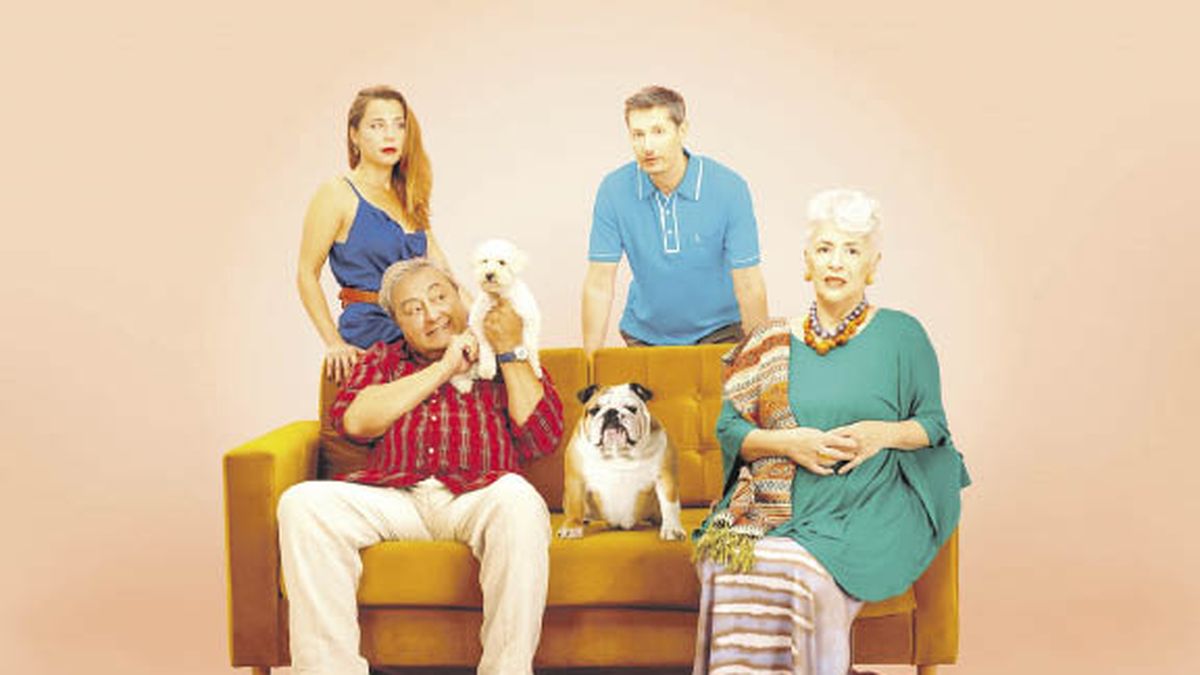Maria Florentino: I’ve never worked on family themes and this work, without being “The Madman and the Shirt”, poses a family dinner and while Rissi, my husband, is only interested in dogs, people begin to sound perverse. I never did an alcoholic who goes to a psychiatrist and medicates herself. I tried to escape from the stereotype of the drunkard and I thought of the woman he takes to escape a bit from reality because this is not a piece of shit. Doing theater is always a risk because you have to continue, in movies or TV it cuts out. It is also a risk to return to the theater without having come out of the pandemic. It was a topic that worried me because the ghost of covid is always there.
Claudio Rissi: Mine is controversial because he talks and talks, and never says anything important. There is an acid humor, especially at the beginning and it is about the place of comfort in which one, despite not agreeing, stays. That happens very often, a boredom emerges from being in a place and yet it is sustained, no matter what. From there arise nonsense of great replicas, there are chicanas with subtlety, rudeness is not appealed to even though they know me for my swearing, that doesn’t exist here. The work wonders what to do when one gets stuck in that tangle of questions and can’t find a way out.
Q.: What other questions arise?
FM: We actors come to our own lives, there is no such thing as getting into the character’s skin because the only known skin is one’s own. Being yourself but in the other’s shoes. At my advanced age, which is no longer 40 years old, I can ask myself for the character if this is really the life I chose. I couldn’t have been anything other than an actress, but is there something I put aside that I didn’t fight for? The work wonders if this is what we choose or if being happy was something else. If this boredom with which I wake up in the morning is because I slept badly or because I should be somewhere else living another life. There is something of conformism, as if it were an imposition. You had to put up with it, my grandmother used to say. It seems that we were infatuated with not admitting that something already happened and we have to move on to something else. Being trapped in a relationship where no one can stand each other anymore and yet they continue to live together, having birthdays, blowing out candles, making wishes and talking about dogs. To fill the silence you have to speak, which is not the same as living.
Q.: As in several of Valente’s works, the discomfort that grows within one character expands towards the others.
CR: My daughter-in-law is the one who starts with her questions as a great trigger, and questions what to do about it. Some want to get out, but we don’t know who will make it. Families are small systems within the large system, and those who do not agree or fit in are the emergents of the family. The ones that break There are those who are not willing to continue with that, but it is not my case, that I bond more with dogs than with people. My character goes through his mute dog and does not talk about his affections, the affection is in the animals. There he deposits that which is constantly questioned.
Q.: How do you see the theatrical scene?
CR: There are more proposals of humor and I sense that the time requires that, people do not want to think or that they are saying something. The confinement pushed to distraction because there are already concerns of all kinds.
FM: In the commercial one reads ´guaranteed laughter and sparks are drawn´. I feel nostalgic for the theater that I was able to do, I remember ´Marathon´ by Ricardo Monti, or Villanueva Cosse at the Cervantes. There is that encouragement in the independent but nobody can live with one show per week, you can’t even eat pizza like we did. I remember the cooperative with ´La cocina´ in the Planeta room when Carlitos Rottemberg produced when he was 19 years old and we were 20 people with performances from Tuesday to Sunday. We lived on it. We will be in El picadero, there are always people, but there will be 3 shows a week. ´Toc Toc´ was a success that I never imagined and we shared a strange experience on stage.
Q.: In what sense?
FM: The public gave their opinion and got into the play with us. He whistled like on the field, like in a football match. Many people came with tocs, there was a woman who was carrying her teenage daughter who had Tourette’s, there were screams like Dayub’s and they were people with that syndrome, many blind people came with their trained dogs. I played the character of checkup toc and the play helped to cure it because I suffered from it in real life. I left the play after three years and it’s still going on. When I saw her I laughed so much that I understood her success. Without being a classic of the theater, it fulfilled the function of the theater: that the human being sees himself live.
Source: Ambito
David William is a talented author who has made a name for himself in the world of writing. He is a professional author who writes on a wide range of topics, from general interest to opinion news. David is currently working as a writer at 24 hours worlds where he brings his unique perspective and in-depth research to his articles, making them both informative and engaging.




